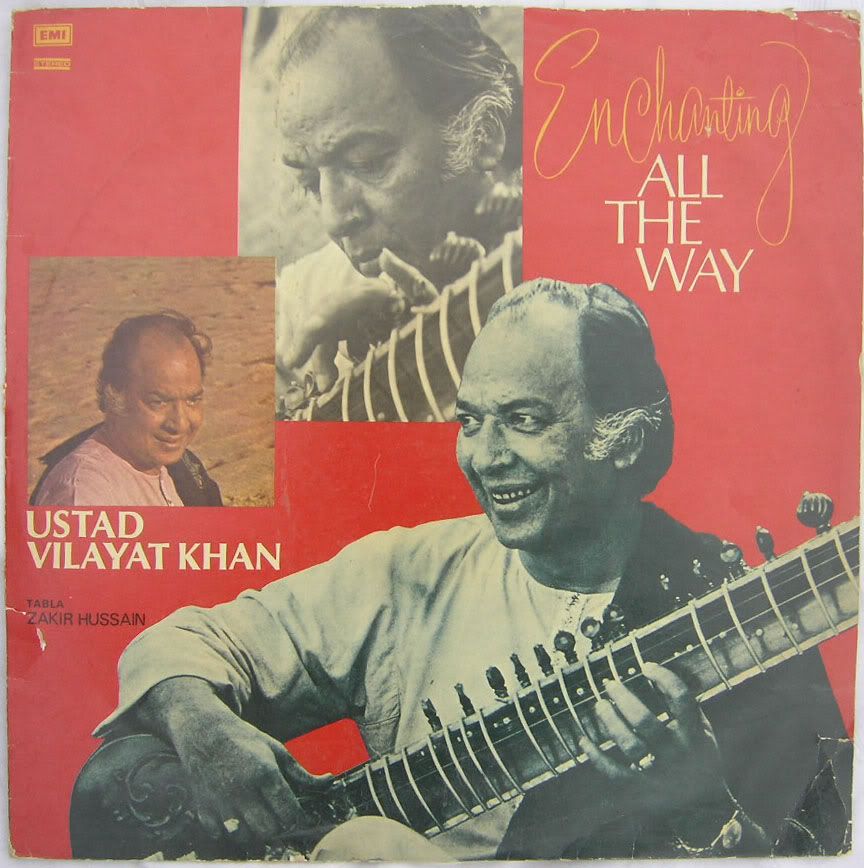India Indian music music: 78 rpm discs genius sitar
by Warren
1 comment
Meta
SiteMeter
Brighter Planet
78 rpm Records of Indian Music: Ustad Vilayat Khan
These sides feature Vilayat Khan at the early height of his powers. Listening through the surface noise and distortion is worth it; he plays with intensity, concentration and emotional clarity in a way that has never been duplicated.

This is not the cover of the record you are listening to.
Wiki:
Vilayat Khan was born in Gauripur, British India to Enayat Khan, a sitar maestro. His family of musicians trace their pedigree back to the court musicians of the Mughals. His father, recognised as a leading sitar and surbahar (bass sitar) player of his time, as had been the grandfather, Imdad Khan, before him. He was taught in the family style, known as the Imdadkhani Gharana or Etawah Gharana, after a village outside Agra where Imdad Khan lived.
However, Enayat Khan died when Vilayat was only nine, so much of his education came from the rest of his family: his uncle, sitar and surbahar maestro Wahid Khan, his maternal grandfather, singer Bande Hassan Khan, and his mother, Bashiran Begum, who had studied the practice procedure of his forefathers. Vilayat’s uncle Zinde Hassan looked after his riyaz (practice). As a boy, Vilayat wanted to be a singer; but his mother, herself from a family of vocalists, felt he had a strong responsibility to bear the family torch as a sitar maestro.
Raga Shyam Kalyan
Raga Bhairavi:
Vilayat Khan taught or otherwise influenced many of of today’s prominent musicians. These include Vilayat Khan’s two sons Ustad Shujaat Khan, and Hidyat Khan, as well as Pdt. Arvind Parikh. Even Vilayat Khan’s younger brother, Ustad Imrat Khan (sitar and surbahar) was taught by him in his younger days. It should also be noted that Vilayat Khan’s nephew Rais Khan is also a famous sitarist.
Vilayat Khan died of lung cancer at the Jaslok Hospital in Mumbai on March 13th, 2004. He was 75 years of age.
India Indian music music: genius sitar surbahar
by Warren
3 comments
Meta
SiteMeter
Brighter Planet
78 rpm Records of Indian Music: Ustad Enayet Khan
Ustad Enayet Khan is one of the most important names in Hindustani instrumental tradition, both for his own genius and for his illustrious ancestry and descendants.
Wiki:
Enayat Khan (Urdu: عنایت خان ) was one of India’s most influential sitar and surbahar players in the first decades of the 20th Century. He was the father of Vilayat Khan, one of the topmost sitariyas of the postwar period.Enayat Khan was born in Uttar Pradesh into a family of musicians.[1] His father was sitar great Imdad Khan, who taught him the sitar and surbahar (bass sitar) in the family style, known as the Imdadkhani Gharana or Etawah Gharana (school), after a village outside Agra where Imdad once lived. He married Basiran Bibi, daughter of khyal singer Bande Hussain, and settled with his family in Calcutta, where, though he only lived to 43, he did much pioneering work on the sitar. For example, he standardised its physical dimensions and added the upper resonator gourd, which is very popular with today’s players (though his own descendants have not kept using it). In a place rapidly developing into an important North Indian centre of the arts, at a time where interest in national culture was strong fuelled by the struggle for independence, he brought sitar music out from its narrow connoisseur circles to new mass audiences. Nobel laureate Rabindranath Tagore was a musical collaborator and personal friend. Some of Enayat Khan’s recordings have been released on CD, on the Great Gharanas: Imdadkhani compilation in RPG/EMI’s Chairman’s Choice series.
Enayat died young, with four children. His two sons, Vilayat and Imrat, were trained in the Imdadkhani style by other members of his extended family. Vilayat learned the sitar and Imrat the surbahar; both were to become very famous classical musicians.
Surbahar alap: Raga Purbi
Sitar Gat in Raga Bihari
